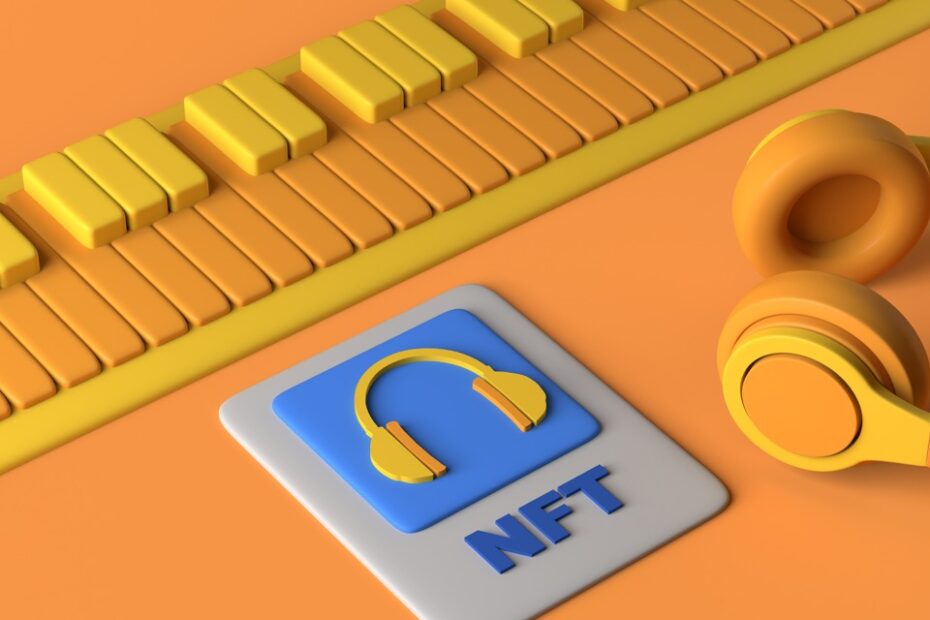In the ever-evolving tapestry of the music world, today’s digital transformation stands out as a poignant symphony of change and opportunity. At this pivotal juncture, the Digital music revolution, with its Web 3 nuances, the groundbreaking potential of NFTs, and the immersive experiences of the Metaverse, forms the cutting-edge trifecta of the future soundscape.
The Rhythmic Pulse of Web 3 in Music
Decoding Web 3 and its Disruptive Impact on the Music Industry
Web 3, often termed as the decentralized internet, is more than just a buzzword when it comes to the contemporary music landscape. It represents a seismic shift from centralized control to a more democratic and user-centric ecosystem. The music industry, traditionally governed by gatekeepers – be it record labels, agents, or radio stations – is now witnessing a paradigm shift. Artists are now equipped with tools that allow them to take their destinies into their own hands, thanks to the disruptive force of Web 3.
The Empowered Artist: Circumventing Traditional Gatekeepers
Gone are the days when musicians needed validation from record labels to achieve success. Web 3 offers platforms where artists can directly interact with their fanbase, launch their albums, and even set tours, all while retaining a majority of their earnings. This empowerment means that artists can bypass the traditional gatekeepers, setting a precedent for a decentralized music world. The result? A more equitable distribution of resources, a closer bond between artists and fans, and a democratization of success in the industry.
NFTs: The Golden Ticket for Musicians
A Closer Look at How NFTs are Revolutionizing Music Monetization
Non-fungible tokens (NFTs) have burst onto the scene as a revolutionary way to monetize art, and the music industry is no exception. Imagine owning a limited-edition vinyl from your favorite artist, but in digital format, with the authenticity verified on a blockchain. That’s the magic of NFTs. They allow artists to sell their music as unique digital collectibles, ensuring that their art remains rare and valuable. Furthermore, every time an NFT changes hands in the secondary market, the original creator can earn royalties, paving the way for a sustainable income source.
Opportunities and Challenges in the Music NFT Space
The allure of NFTs in the music realm is undeniable. They open doors for artists to host virtual concerts with NFT tickets, create limited edition album art, or even engage fans in unique experiences. However, the terrain is not without its challenges. As the space gets more saturated, artists need to bring innovative strategies to ensure their NFTs stand out. Moreover, understanding the intricacies of blockchain and ensuring that fans have access to the necessary tech to engage with NFTs are hurdles to overcome. Yet, for those willing to navigate this nascent territory, the opportunities are boundless.
Building a Successful Web 3 Music Business
Identifying Profitable Niches in the Web 3 Music Ecosystem
In the vast Web 3 realm, specificity is a strength. Finding a niche allows you to cater to a targeted audience, increasing the potential for deeper connections and engagement. Start by analyzing current trends, understanding the preferences of modern music enthusiasts, and identifying gaps in the market. Do fans crave behind-the-scenes content? Is there a demand for specific genres or fusion styles in the decentralized space? Answering these questions can guide you to a profitable music niche ripe for innovation.
Minting and Promoting Music NFTs Effectively
Minting is the process of creating an NFT, converting your music or related artwork into a verified digital collectible on the blockchain. Platforms like OpenSea, Rarible, or Mintable can facilitate this, but it’s essential to do thorough research and possibly consult with blockchain experts to navigate the nuances.
Once your NFTs are minted, promotion is pivotal. Leverage social media, collaborate with influencers in the crypto space, and engage in community discussions to spread the word. Remember, the value of an NFT isn’t just in its content, but in its perceived value. High-quality promotional efforts can amplify this perception.
Tapping into the Metaverse for Brand Amplification
The Metaverse – vast, interconnected digital universes – provides an unmatched stage for brand amplification. Host virtual concerts, launch digital merchandise, or even set up virtual fan meets in popular Metaverse platforms like Decentraland or Cryptovoxels. Remember, in the Metaverse, experiences are as valuable as tangible products. So, focus on creating memorable experiences, which can lead to organic brand growth and fan loyalty.
Top 6 Entrepreneurial Ventures in the Web 3 Music Landscape
1. Metaverse Music Festivals and Concerts
Imagine attending a concert from the comfort of your home, yet feeling the electrifying energy of a live show. Metaverse music festivals make this a reality. Using VR tech, artists can perform for global audiences, creating immersive experiences that transcend physical boundaries.
2. Exclusive NFT Music Releases
Instead of traditional album launches, artists can release exclusive tracks or albums as NFTs. These limited-edition releases can fetch premium prices, especially if they come with added benefits like virtual meet-and-greets or physical merchandise.
3. Blockchain-based Fan Engagement and Loyalty Programs
Blockchain’s transparent and secure nature makes it perfect for fan engagement programs. Artists can reward loyal fans with tokens, which can be redeemed for exclusive content, early ticket access, or unique experiences.
4. Decentralized Music Collaboration Platforms
The music industry thrives on collaboration. Platforms that leverage Web 3 can allow artists from across the globe to collaborate in real-time, co-create music, and share revenues transparently.
5. Web 3 Music Education Hubs
As the world moves towards decentralized tech, there’s a growing demand for education. Online hubs that teach aspiring artists about Web 3, NFTs, and the Metaverse can become valuable resources, nurturing the next generation of digital-first musicians.
6. NFT Music Merchandise and Collectibles
Beyond music, artists can mint limited edition digital merchandise, from album art to virtual apparel. These collectibles, verifiable on the blockchain, can become sought-after items for fans, adding another revenue stream for musicians.
A New Dawn for the Music Industry
Reflecting on the Paradigm Shift from Traditional to Decentralized Music Business Models
The music industry, once guarded by gatekeepers and major labels, is undergoing a seismic shift. The advent of decentralized technologies, like blockchain, has democratized the scene, putting power back into the hands of creators. This paradigm shift has ushered in a new era where artists can directly connect with fans, bypassing intermediaries and retaining a larger chunk of their revenues.
Anticipating the Next Big Trends and How They’ll Shape the Music World
While Web 3, NFTs, and the Metaverse are currently at the forefront, the music industry’s evolution won’t stop here. As decentralized finance (DeFi) solutions grow, we could see more intricate and fair revenue models for artists. Moreover, the blend of AI with music promises personalized experiences for listeners, reshaping content discovery and creation.
The Broader Societal Implications of a Decentralized Music Industry
Beyond just tunes and tracks, this decentralized movement has societal ramifications. It speaks to a future where monopolies are diminished, and individuals have more control over their creations. A world where authenticity reigns, and fans truly support their beloved artists, leading to richer, more diverse musical landscapes.
FAQs for the Forward-Thinking Music Entrepreneur
How do I start with minting my music as NFTs?
Begin by selecting a reputable blockchain platform that supports NFT creation, such as Ethereum. After ensuring you have the legal rights to mint your music, use platforms like OpenSea or Rarible to mint your NFT, set a price, and list it for your audience.
What are the benefits of hosting music events in the Metaverse?
Hosting events in the Metaverse allows for global reach without geographical constraints. It provides immersive experiences, often at a fraction of the cost of physical events, and can generate significant revenue through ticket sales, virtual merchandise, and brand partnerships.
How does blockchain ensure fair royalty distribution?
Blockchain’s transparent and immutable ledger system ensures that every transaction (like a song stream or purchase) is recorded. Smart contracts can be programmed to automatically distribute royalties to artists, ensuring fairness and reducing chances of disputes.
What should I know about copyright and NFTs?
While minting an NFT, you’re essentially creating a verified digital certificate of your work. However, it doesn’t inherently transfer copyright. Ensure you clearly specify the rights you’re granting to the buyer, whether it’s just ownership of the NFT or more extensive rights like reproduction.
In conclusion
The intersection of music and groundbreaking technology paints a promising picture of the future. As melodies meet the Metaverse and blockchain beats, we stand at the precipice of uncharted territories. For entrepreneurs and artists alike, the horizon is rife with opportunities, beckoning those ready to pioneer this harmonious fusion and shape the symphony of tomorrow.

Eric Dalius is The Executive Chairman of MuzicSwipe, a music and content discovery platform designed to maximize artist discovery and optimize fan relationships. He also hosts the weekly podcast “FULLSPEED,” showcasing conversations with trailblazing entrepreneurs from various fields. Through the “Eric Dalius Foundation,” Eric has created four scholarships for US students. Connect with Eric on Twitter, Facebook, LinkedIn, Instagram, and Entrepreneur.com.

